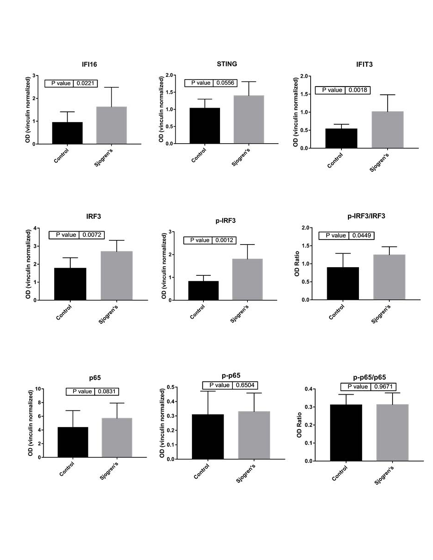Session Information
Session Type: ACR Poster Session A
Session Time: 9:00AM-11:00AM
Background/Purpose: Type I IFN expression is known to be upregulated in the salivary glands of patients with SjogrenÕs syndrome, but the upstream stimuli responsible for this IFN signature are not known. IFI16 is a cytoplasmic DNA sensor that stimulates the production of type I IFN in response to cytoplasmic DNA via the STING-IRF3/NFkB pathway. IFI16 expression is also induced by IFN I, and therefore establishes a mutually reinforcing feedback loop. IFI16 is the target of autoantibodies in SjogrenÕs syndrome and is known to be expressed in the salivary gland. We sought to determine whether the elements of this DNA sensing pathway downstream of IFI16 were upregulated in the labial salivary glands of patients with SjogrenÕs syndrome.
Methods: Protein lysates were generated from minor salivary glands obtained from patients with SjogrenÕs syndrome (n=12) and sicca controls (n=7). All patients with SjogrenÕs syndrome met the ACR criteria for SjogrenÕs syndrome; none of the controls met these criteria. Protein lysates were subjected to SDS-PAGE electophoresis followed by Western blotting for the following proteins: IFI16, STING, IRF3, phospho-IRF3, p65, phospho-p65, IFIT3 (as a marker of type I IFN signaling), and vinculin (as loading control). Western blot results were subjected to densitometry analysis and statistical analysis was performed using GraphPad Prism 7.00 (Mann-Whitney analysis for nonparametric variables).
Results: IFI16, STING, IRF3, and p-IRF3 were found to be upregulated in SjogrenÕs patients as compared to controls. The ratio of phosphorylated IRF3/total IRF3 was also increased in SjogrenÕs patients, implying enhanced activation of this signaling pathway. IFIT3, which is a marker of type I IFN expression, was also upregulated in patients. While NF-kB has been proposed to signal downstream of IFI16 in in vitro studies, we did not find p65 to be significantly upregulated nor phosphorylated in SjogrenÕs patients as opposed to controls.
Conclusion: These data indicate that the STING-IRF3-IFN DNA sensing pathway which functions downstream of IFI16 is upregulated and activated in the target tissues of SjogrenÕs patients. These data imply that DNA sensing in the minor salivary gland may be a stimulus for IFN I production in this tissue. Figure 1: Western Blot Analysis of Salivary Gland Protein Lysates
To cite this abstract in AMA style:
Antiochos B, Casciola-Rosen L, Rosen A. Upregulation and Activation of the IFI16-Sting-IRF3-IFN Pathway in Sjogren’s Salivary Glands [abstract]. Arthritis Rheumatol. 2016; 68 (suppl 10). https://acrabstracts.org/abstract/upregulation-and-activation-of-the-ifi16-sting-irf3-ifn-pathway-in-sjogrens-salivary-glands/. Accessed .« Back to 2016 ACR/ARHP Annual Meeting
ACR Meeting Abstracts - https://acrabstracts.org/abstract/upregulation-and-activation-of-the-ifi16-sting-irf3-ifn-pathway-in-sjogrens-salivary-glands/


